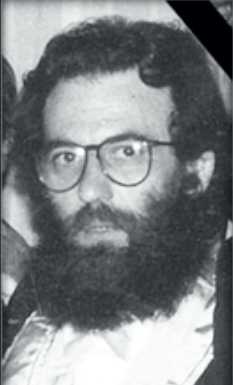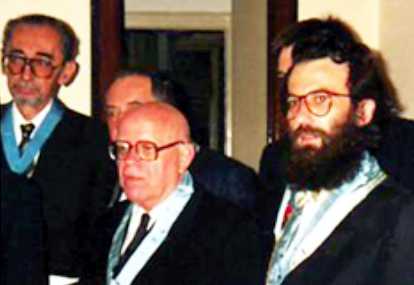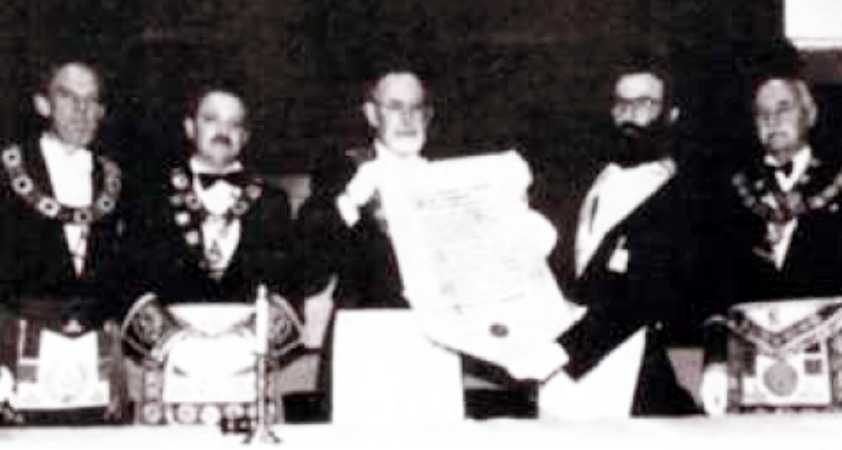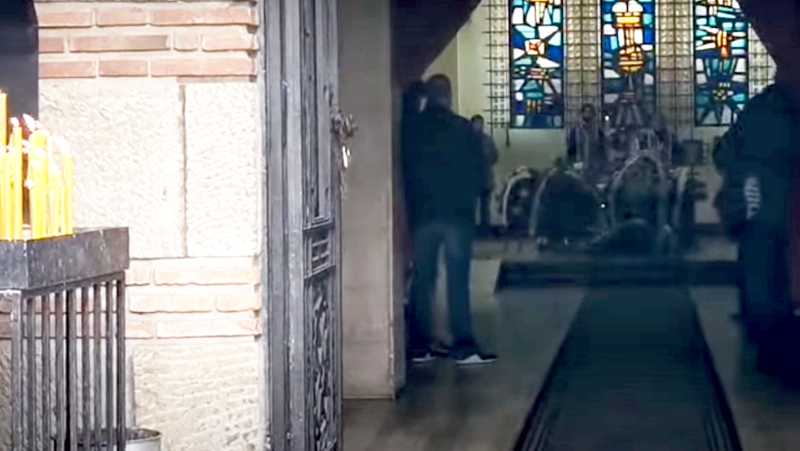Zoran Nenezić was born in Belgrade on December 16, 1952, and died on March 25, 2021. He graduated from the Faculty of Philology, University of Belgrade, Department of Serbo-Croatian Language and Yugoslav Literature. During his professional life, he worked as a self-government ombudsman, analyst, writer, publicist, historian and journalist. He wrote poetry and prose and published newspaper articles both in the country and abroad. He worked as a journalist for “Duga”, and his interviews were published by almost all leading daily and weekly newspapers. The work of Zoran Nenezić within Freemasonry is of great (historical) significance, and his works will remain to speak on his behalf. Zoran Nenezić was initiated in lodge number 217 in Düsseldorf, where he received both the second and third degree. After that, he became the first honorable master of the renewed lodge “Pobratim”. The most significant works of this Serbian Freemason are the books “Masons in Yugoslavia” (1764-1980) (editions from 1984, 1987, 1988); “Masons in Yugoslavia: 1764-1999 – a review of the history of Freemasonry in Yugoslavia – special edition (1999)”; “Serbian Freemasonry: 1764-1914 (2012)”; “The beginnings of Masonic work in Serbia at the end of the 19th century: with a review of the membership of Stevan Stojanović Mokranjac” (2018); “Knightly-Templar traces among Serbs in the Middle Ages” (2019) and others. Thanks to his work on the topics of Freemasonry, Nenezić positioned himself as a leading expert in this field both on the territory of today’s Serbia and in the region, but also at the world level.

Numerous authors have written about his work, and we publish the list of selected books that dealt with the work of Zoran Nenezić as an integral part of this work (Appendix). To understand the context of the time before the 1990s in Serbia and how it was not at all easy to deal with the problems of Freemasonry and write about it, we can recall the words of Vladimir Dedijer when he wrote to General Pavle Jaksic in the preface to the book “Above Memories”: “You will be able to write but you will never be able to publish! ”.
The most important role of Nenezić in the world of Freemasonry is actually reflected in the initiation of the re-establishment of the work of Freemasonry after 1990. Namely, since the Grand Lodge of the Kingdom of Serbia was founded in 1912, it functioned under that name until the creation of the Kingdom of SCS and the formation of the Grand Lodge of the Kingdom of SCS (Later the Grand Lodge of Yugoslavia). At the beginning of the Second World War, all the lodges were put to sleep, until 1990, when the lodges Pobratim, Sloga, Rad i postojanstvo and Maksimilijan Vrhovac awoke in April. In June 1990, the Grand United Lodge of Germany reactivated the Grand Lodge of Yugoslavia with a constitution and statute that were adopted back in 1925.
Then, Zoran Nenezić, who was the honorable master of the respected Lodge of the Brothers, was elected Grand Master. With the reactivation of Freemasonry under the auspices of the “Supreme Council of the Southern Jurisdiction of the United States”, the Supreme Council of the Scottish Order of Yugoslavia was officially renewed. At that time, Zoran Nenezić was elected Grand Commander, and later, due to the formation of the Regular Grand Lodge of Yugoslavia in 2002, Nenezić remained in the positions of Grand Master of the Grand Lodge of Yugoslavia and Grand Commander of the Scottish Order of Yugoslavia.
Nenezic is the author of numerous texts that shed additional light on historical events, and among them are the following texts: “Broz Churchill’s Agent”; “The regime renews the lodge” (which speaks of the state’s interest in suppressing intrigue in world Freemasonry); “Long list of executed Freemasons”; “Prison without defense!” ; “Advised to death”, “Builders of new roads”; “Numerous professors and academics continued to play important roles after the war”; “KPJ since the arrival of Josip Broz with the Freemasons”, “Brothers defending Broz”, “French lodges against Russian accusations against Tito”; “Vatican inspirer of years of persecution of Serbs”; “Stepinac’s Guilt”; “Harry Truman supported Serbian masons” and others.
In his books, Zoran Nenezić wrote about the history of Freemasonry in the world and in our country, and thus left a legacy, but also important material and guidelines for further research. For example, in his book Freemasons of Yugoslavia (1764-1980), he writes about the early influence of imperial forces on the events in the then Serbia, stating: “..but to a certain extent also the internal politics of Serbia, which is best seen from Garašanin’s “Drawings” (Načertanije), their influence was significant on the practical political and cultural organization in Serbia during the government of the Ombudsman 1842-1858. years.”
Also, Zoran Nenezić diligently collected numerous materials for decades and exchanged them in order to understand the historical context of the development of Freemasonry. He generously exchanged the collected materials with other authors from the region interested in researching these problems. This is evidenced by the allegations of gratitude published in the book “Freemasonry in Croats”.

Some controversies arose in connection with Nenezić’s work on his books, and journalist and publicist Marko Lopušina writes about one of them and states: “A few weeks before the news of Josip Broz’s death was published, Zoran Nenezić was asked to write a text about Freemasonry, which was published in NIN (weekly journal). After the text, in which the publication of Zoran Nenezić’s book was published (“Masons in Yugoslavia, 1763-1980”), the Presidency of the SFRY, i.e. the Federal Council for the Protection of the Constitutional Order, whose president was Stane Dolanc, considered, based on expertise security services possible implications, domestic and foreign, of publishing one such book. Authorities and secret services did not have information on what the book contained and tried to steal Zoran Nenezic’s manuscript before it was published. “
Nenezic also wrote about the oath to the Grand Master of the U.G.L. of Germany, Ernst Walter, during the ritual in the Sava Center on June 23, 1990. year, reminding of the beginnings when in 1989, Dr. Zlatko Lemberger raised the issue of reactivation of G.L. Yugoslavia. Nenezić speaks unequivocally about Walter’s motives: “From day one, Walter’s motives were clear, moral, Masonic and honorable. That’s it after the renewed work of G.L. “Jugoslavija” to the present Yugoslav journalists unequivocally stated – that it was the return of only a small part of the debt that the Germans have towards Yugoslavia, because, in a combination of historical circumstances, the policy of the German fascist Reich led to the self-sleep of G.L. “Yugoslavia” on August 1, 1940. “
Slobodan Vucetic was also informed about the events at that time as a member of the Presidency of Serbia, and later Slobodan Milosevic as the President of the Presidency of Serbia. Nenezic writes about it:”I informed him about the initiative for the establishment of G.L. “Yugoslavia”, which will be carried out in June of that year, with the help of U.G.L. Germany, which agreed to do so on the condition that it be extended. On the then SFRY, unlike the Austrian initiative, which was related to Slovenia and Croatia and where Ante Markovic also has certain influences. I pointed out that the government in the West is simplified understanding the democracy of a society and in terms of the free work of a Masonic organization. Therefore, this was an opportunity to improve the image of Serbia, as registrations cannot be made in Ljubljana and Zagreb, because there was a widespread opinion that it was the only communist bastion in Yugoslavia (attempts to register one lodge in Zagreb and another in Ljubljana did not succeed due to the extremely negative attitude of the state authorities towards that initiative, but also due to the fear of the members there of possible state repression.) ”

Such activities of Nenezić can be considered deeply partisan and in accordance with Masonic principles, and they certainly represent historical events of importance for Freemasons but also for the citizens of Serbia. Nenezic further states about the conversation with Milosevic: “As a possible future Grand Master, I pointed out that Freemasonry is a patriotic organization that renounces secret political and revolutionary ideas, that it is a humanitarian organization that works for the benefit of its people and its country. The process of reactivation of Freemasonry in Eastern Europe, started with Hungary, will continue, and I thought that, when such an initiative was already launched in Yugoslavia, it should be completed in accordance with the inevitable democratization. We agreed that it would not be advisable to inform the public about the conversation and its content, due to the then intensified political processes in the country.
Nenezic played a significant role during the stay of the delegation of the Yugoslavia in California in February 1991, when a meeting with Freemasons of Serbian origin took place in the United States. Croatian Freemasons were invited, but they refused to come, according to Nenezic. Also, Nenezić talks about the fact that he was authorized by Dobrica Ćosić, as the President of FR Yugoslavia, to convey his views on the issues of the Serbian crisis in order to resolve the war conflicts peacefully. In 1992, Nenezic held talks on this topic with Freemasons, but also with a number of members of the Senate and Congress, generals and admirals, and with the support of Comrade Kleiknecht, in order to establish peace in Bosnia and Herzegovina.
Furthermore, Nenezić states: “At the beginning of June 1991, a number of Freemasons from G.L. Yugoslavia entered the Scottish ritual in Prague, together with Freemasons from the then G.L. of Czechoslovakia, under the auspices of the Supreme Council of the Southern Jurisdiction of the US Scottish Ritual for the formation of the G.L.Yugoslavia. The initiation of the Yugoslav Freemasons into the Scottish ritual was also attended by the Commander of the Southern Jurisdiction of the USA, Fred Kleiknecht, which gave this act special significance. “
Nenezić also dealt with the role of the Vatican and their deviation towards Freemasonry, and states: “In 1990, a crisis committee was formed in the Vatican under the direct leadership of Pope John Paul II to monitor and fight against the development of Freemasonry in Eastern Europe, especially in Yugoslavia. This meant unreserved support for the secession of Slovenia and Croatia and activities calculated to prevent the realization of “Serbian Masonic influence” on international factors involved in resolving the Yugoslav political and state crisis. When the Yugoslav political leadership accepted the “good services” of the European Community and when the missions of the “European Threesome” (Dani de Mikelis, Hans van den Bruck and Jacques Pos) became more frequent in Yugoslavia, a strong Vatican reaction followed, publicly announced in the manner of its millennial traditions, indirectly, through two Catholic newspapers (“Il sabato” and “Familiglia Cristiana”) and several spokesmen, members of the Christian Democratic Party of Italy. “
Having all the above in mind, it is obvious that the work of Zoran Nenezić will outlive him and leave an indelible mark in Serbian and regional Freemasonry. Numerous media also wrote about it, and on this occasion we enclose Zoran Nenezić’s announcement during the presentation of the Serbian translation of the famous book “Born in Blood” in Belgrade in 2015: “Zoran Nenezić, the greatest connoisseur of Freemasonry, not only in Serbia but also in the world, has the opportunity on several occasions to meet the author of the book “Born in Blood” John J. Robinson, about whom he says: “As he wrote, so he spoke. He was not enslaved to any dogma. He unfolded all pseudo-romantic and other theories about the origin of modern Freemasonry, went to research and wrote the best book on the roots of the origin of modern Freemasonry.
Nenezić’s analytical approach left enough quality results of the work that will serve as a credible foundation for further research on various aspects of Freemasonry. His role in the re-establishment of Freemasonry in Serbia as well as his role in international negotiations to achieve peaceful solutions to the then state conflicts will be remembered as shining examples, patriotic actions but also acting in accordance with Masonic principles. Numerous media reported about the death of Zoran Nenezić to the public, and “Glas javnosti” broadcast the funeral (Link: : https://www.glas-javnosti.rs/drustvo/glas-javnosti-uzivo-sahrana-zorana-nenezica-na-novom-groblju-6837).

May Zoran Nenezic’s path to the Eternal East be illuminated!
In the Orient of France,
Br. M.S.
P.L. George Weifert
03.04.6021.G.I.S.
Appendix
1) They wrote about Zoran Nenezić (among others):
- Gasic Ranka. Serbian Freemasons between the two world wars as a social group. Yearbook of Social History. vol. 5, no. 1-3, p. 85-100. 1998
- Yearbook. Proceedings, Volume One, MMX. Editor Alexandar Thorn. Independent author’s edition. Belgrade. 2013. Edition of the Archives of the Holy Kingdom of Magic
- Pavle Jakšić. Above the memories. Rad. Belgrade. 1990
- Lopušina Marko. MASONS IN SERBIA. 1910 – 2010. Book of Commerce. Belgrade. 2010
- Minić Nenad, Ordo Mundi. Printing house “Stanišić” Serbia, Bačka Palanka. 2006
- Nenad Minić. ORDOMUNDI. Belgrade. 2010
- Mladen Lojkić. Rulers of the World. II supplemented edition. Daruvar. 2007
- Mužić Ivan, Freemasonry in Croats, V. Edition, Verbum, Split, 1997
- Mužić Ivan. Freemasonry in Croats / Ivan Muţić – 6th ed. – Split: Laus, 2000.
- Mužić Ivan. The meaning of Freemasonry. Naklada Bošković. Split. 2003
- Nikolic Zoran. MASONIC SIGNS IN BELGRADE. 2004 (published as a feuilleton within Večernje Novosti)
- Rogošić Branko – Masonry: science or scientific discipline ?. 2014
- Vidojevic Milan. The Omega Dossier. Metaphysics. 2006
2) Selected bibliography of Zoran Nenezić:
- Masons in Yugoslavia: (1764-1980): an overview of the history of Freemasonry in Yugoslavia. Belgrade: Narodna knjiga, 1984
- Masons in Yugoslavia: (1764-1980): a review of the history of Freemasonry in Yugoslavia: contributions and materials. 2nd supplemented ed. Belgrade: Narodna knjiga, 1987• Masons in Yugoslavia: (1764-1980): a review of the history of Freemasonry in Yugoslavia: contributions and materials. Nenezić, Zoran D., 3rd supplemented ed. Belgrade: Zodne, 1988
- Masons in Yugoslavia: 1764-1999: an overview of the history of Freemasonry in Yugoslavia: contributions and materials. Special edition. Belgrade: Z. D. Nenezić, 1999
- Masons: 1717-2010, Review of the History of Freemasonry in Serbia, the Balkans and the World: Contributions and Materials. Belgrade: Z. Nenezić, 2010
- Serbian Freemasonry: 1764-1914: an illustrated overview of the history of Freemasonry among Serbs: contributions and materials. Belgrade: Z. Nenezić, 2012
- The beginnings of Masonic work in Serbia at the end of the 19th century: with reference to the membership of Stevan Stojanović Mokranjac. Negotin: National Library “Dositej Novaković”, 2018
- Knightly-Templar traces among Serbs in the Middle Ages. Belgrade: Z. Nenezic, 2019